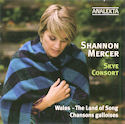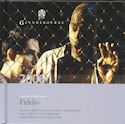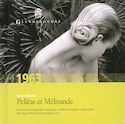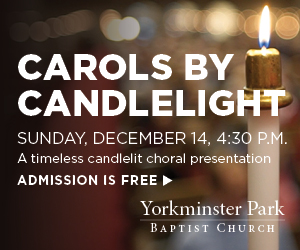|
|
Beethoven - Fidelio Kennedy; Sherratt; Coleman-Wright; Kampe; Milne; London Philharmonic Orchestra; Mark Elder Glyndebourne GFOCD 004-06
Debussy - Pelléas et Mélisande Roux; Duval; Reynolds; Hoekman; Wilbrink; Bredy; Shirley-Quirk; Royal Philharmonic Orchestra; Vittoria Gui Glyndebourne GFOCD 003-63 |
|
This year the Glyndebourne Festival in Sussex, England celebrates its 75th year. This is no mean achievement considering its survival depends entirely on private funds and donations. For any artist it has always been a great honour to be invited to be the guest of the Christie family, the founders and owners of this event. There have been many improvements over the years not the least of which is the magnificent new auditorium built in 1994. Glyndebourne has always been in the forefront of recording opera. As early as the 1930’s they were doing Mozart operas on EMI like the famous Don Giovanni with Fritz Busch. This year they have begun issuing recordings under their own label and this month we are presented with two of these: an inspired Fidelio from 2006 and from the archives, a 1963 performance of Pelléas et Mélisande. Beethoven’s only opera embodies his innermost philosophy of life, the triumph of good against evil and the journey from darkness to light. This is what the Leonore Overture #3 does by compressing the journey into perhaps the most glorious 15 minutes of music ever written. With an emphasis on the symphonic nature of the opera, Mark Elder and his London Philharmonic, with excellent pacing and throbbing energy propel the music forward and yet illuminate all the nuances. Similar to the 9th Symphony the finale is truly an explosion and a culmination of joy. The almost faultless cast deserves much credit. Soprano Anja Kampe as the heroine sings with heartfelt passion and tenderness and occasional outbursts of sincere indignation; Tornsten Kerl, the wrongfully convicted Florestan, has a shorter but no less gruelling role and his strong heroic tenor overcomes all the difficulties. The Glyndebourne Choir also makes a tremendous contribution. At the end of the 19th century French music was under the heavy influence of Wagner and Brahms. A fervent desire for change was in the air and the young Debussy was the right man at the right time to bring it about. With new harmonies and translucent textures he brought in a breath of fresh air with a completely new approach, l’impressionisme. His sole opera Pelléas et Mélisande is a sublime masterpiece and a pinnacle of French art. It is totally different from anything written before yet, to be honest, still owes homage to Tristan and Parsifal which Debussy admired. Its long score is delicate but of the highest inspiration and every phrase is meaningful. It moves in the atmosphere of shadows, in and out of silence, generally quiet, rarely reaching a fortissimo. This performance from 1963 is an inspired one from the beautifully poetic impressionistic sets by Beni Montresor, through the incisive and sympathetic conducting of Vittorio Gui to the faultless, impressive cast. French soprano Denise Duval is exceptional as the fragile, semi wild creature Mélisande. Dutch baritone Hans Wilbrink with his slow awareness to love and ardent declaration is most memorable. A worthwhile listening experience. Last but not least, an A+ for presentation of these discs: elegantly designed hardcover books, with complete quattro lingual libretto. They will be a treasure for any collector. Janos Gardonyi |
|
|
Wales - The Land of Song Shannon Mercer; Skye Consort Analekta AN 2 9965 In her fourth CD for Analekta, once again the lovely soprano voice of Shannon Mercer rings clear and true, this time in a most warm and heartfelt performance of Welsh songs. As the daughter of a long-time member of the Ottawa Welsh Society, Mercer well understands music and language as the cultural glue that binds people of Welsh descent. And what fond melodies they are. In fact, Mercer attributes her choice of career to the influence Welsh song had in her young life. The imagery inherent in the poetic language along with the sweet lyrical melodies chosen for this recording have quite an emotive impact on the listener, despite the fact that no translations are provided in the liner notes. Best-known pieces on this album are the well-loved lullaby Suo Gan, as well as the poignant Dafydd a Gareg Wen (David of the White Rock) and the unrequited Bugeillo’r Gwenith Gwyn. In arranging the accompaniments and instrumental pieces, Sean Dagher has done a marvellous job of preserving traditional elements while melding them to a more contemporary aesthetic. The Skye Consort which includes flute, violins, cello, bass, cittern, accordion and percussion adds a 17th-century Italian harp similar to the Welsh triple-harp. Beautifully played, beautifully sung. Dianne Wells |
 |





